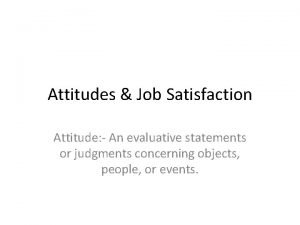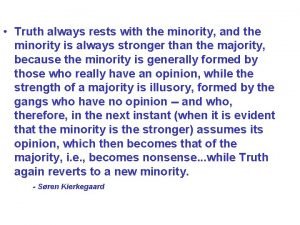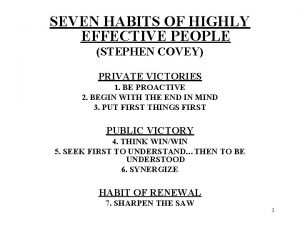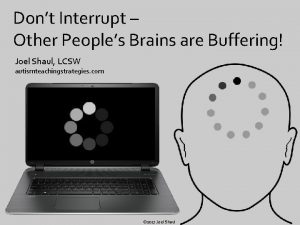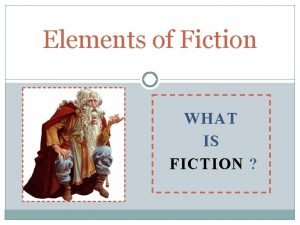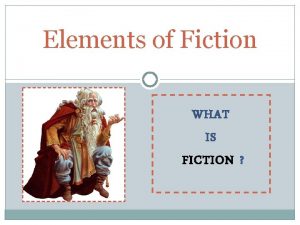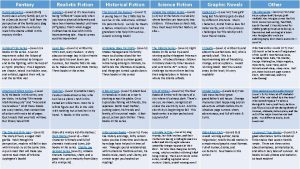ATTITUDES TRUTH OR FICTION Peoples attitudes are always



























- Slides: 27

ATTITUDES

TRUTH OR FICTION? People’s attitudes are always consistent with their behavior. Showing television commercials over and over reduces their effectiveness. People who are victims of prejudice usually feel empathy for others who are victims of prejudice. Our first impressions of other people tend to have lasting effects on our relationship with them. When it comes to choosing a partner or friend, “opposites attract. ”


ATTITUDES Are beliefs and feelings about objects, people, and events that led people to behave in certain ways. Example: A person’s attitude about strangers can influence how that person feels and behaves around people he or she does not know. § If a person believes that strangers are dangerous, that person is likely to feel afraid around strangers & may try to avoid situations where he/she is likely to meet new people. Example: If a person believes that strangers are people just like him/her, that person is more likely to feel open toward strangers and try to know them better.

ATTITUDES & SOCIAL COGNITION Attitudes are a major aspect of social cognition § Social cognition: to gather information about and understand the rules and concepts that govern our social interactions § The ways in which we understand social rules of etiquette, proximity, gestures, inferences, etc. § At its essence, social cognition includes the processes we use to understand the world around us. § Social cognitions involve thoughts about others and thoughts about the self in relationship to others.

ATTITUDES Attitudes are an important aspect of our psychological lives because they foster strong emotions, such as love or hate. Examples: § Negative attitudes, such as prejudice, CAN lead people to harm others. § Positive attitudes, such as attraction, CAN encourage people to help others.

HOW ATTITUDES DEVELOP People often have attitudes about things they never experienced directly. § Example: People may be opposed to war or capital punishment even though they have no personal experience of either event. Where do such attitudes come from?

HOW ATTITUDES DEVELOP Attitudes develop in a variety of ways: §Conditioning §Observational learning §Cognitive evaluation §The use of cognitive anchors

CONDITIONING Learning through conditioning plays an important role in acquiring attitudes. Children are often reinforced for saying and doing things that are consistent with the attitudes held by their parents, teachers, and other authority figures. § Example: Parents who believe that it is important to share with others may praise, or reinforce, a child who shares a toy with a friend or sibling.

OBSERVATIONAL LEARNING People also acquire attitudes by observing other people. § Example: Teens may observe that classmates who dress, talk, or act in certain ways seem to be admired by their peers. § These teens may adopt the same ways of dressing, talking, or acting because they have learned through observation that doing so might lead to acceptance and approval.

COGNITIVE EVALUATION People often evaluate evidence and form beliefs on the basis of their evaluations. § Example: A person may have the attitude that using a seat belt is important and then always buckle up. After hearing about his/her uncle who survived a car crash only because he was not wearing a seat belt, the person decides NOT to wear a seatbelt. People are likely to evaluate evidence if they think they will have to justify their attitudes to other people. § Example: A teen who wants a part-time job after school may evaluate the evidence about working if he knows he will have to justify it to his parents.

COGNITIVE ANCHORS A person’s earliest attitudes tend to serve as cognitive anchors , or persistent beliefs that shape the ways in which he or she sees the world and interprets events. Cognitive anchors tend to keep a person’s attitudes from changing. These children are learning an attitude of patriotism, which may serve as a cognitive anchor later in life.

ATTITUDES AND BEHAVIOR Attitude: A settled way of thinking or feeling, typically reflected in a person's behavior. The definition of attitude suggests that people’s behavior is always consistent with their attitudes. § THE LINK BETWEEN ATTITUDES AND BEHAVIOR IS NOT ALWAYS STRONG § People often behave in ways that contradict their attitudes. § Example: People know that smoking cigarettes and drinking alcohol excessively are harmful to their health, yet they still smoke and drink excessively. § Example: People realize that it is dangerous to drink and drive, yet they do it just the same. Can you think of other examples?

WHEN BEHAVIOR FOLLOWS ATTITUDES People are more likely to behave in accordance with their attitudes when their attitudes are specifically tied to the behaviors. § Example: Someone who believes that aerobic exercise is necessary to prevent heart disease is more likely to exercise regularly than someone who believes that only a healthy lifestyle is important for good health. Strong attitudes are better predictors of behavior than weak attitudes. § Example: Students who believe strongly in the value of hard work may be more likely to do their homework than students who believe less strongly in hard work.

WHEN BEHAVIOR FOLLOWS ATTITUDES People are more likely to behave in accordance with their attitudes when they have a vested interest, or a personal intake, in the outcome of a behavior. § Example: People are more likely to go to the polls and vote on an issue if the issue affects them directly. Attitudes are more likely to guide behavior when people are aware of them, particularly if the attitudes are put into words and spoken. § Verbalizing and repeating an attitude make it come to mind more quickly, and attitudes that come to mind quickly are more likely to influence how people act.

WHEN BEHAVIOR FOLLOWS ATTITUDES People are more likely to be aware of attitudes that affect them emotionally. § Example: Someone who loves animals is likely to be aware of his attitude about animal rights. § Example: Someone who is angered by destruction of the environment is likely to be aware of her attitudes about recycling.

WHEN ATTITUDES FOLLOW BEHAVIOR Attitudes usually come first and behavior follows § Sometimes the reverse is true. Attitudes are likely to follow behavior when people are encouraged to behave in ways that go against their attitudes. § In such situations, people may suffer cognitive dissonance , an uncomfortable feeling of tension due to a contradiction between attitudes and behaviors. § Some of you may have experienced cognitive dissonance if you have a strong value on independence when we discussed conformity and how everyone conforms to some degree.

WHEN ATTITUDES FOLLOW BEHAVIOR People may try to justify their behavior and gradually change their attitudes to fit their facts. § Example: People were asked to argue in favor of something they did not believe in. Doing so made them feel very uncomfortable, and they eventually modified their attitudes to bring them more in line with their arguments. Have you ever had this experience?

IMPLICIT ASSOCIATION TEST 1. What were your results? 2. What do you interpret (think) them to mean? 3. How do you read the results?

IMPLICIT ASSOCIATION TEST 1. Do you think Harvard would put their name on an unreliable test? 2. Do you think they’d sacrifice their reputation by creating biased questions or tying to trick you?

IMPLICIT ASSOCIATION TEST 1. Can you have unconscious associations without being prejudice? How? 2. When you say, “I don’t have a preference” Well, then would you be ok with being fat, gay, African American or of a different ancestory, handicapped…?

Just because you are white does not mean you will have a strong association or vice versa. Just because you have a preference does not mean you treat people differently.

WOULD YOU RATHER BE… Thin or Fat? Straight or Gay? Young or Old? Abled or Disabled?

DO YOU PERCEIVE THAT IT IS IT EASIER TO BE… Christian or Non Christian? Straight or Gay? Black or White? Teen or 30? Male or Female? These are associations. It doesn’t mean you act on them.

Do two young people always have more in common than an old and young person?

Think about what your idea of marriage is… § Has it always been like that? . . . § Male & Female = Cognitive Anchor § Your Uncle & His Partner = Cognitive Evaluation Doing your homework because your brother dropped out of school, and now is considered a bum. = Observational Learning

HOW CONSISTENT ARE YOUR ATTITUDES AND YOUR BELIEFS ABOUT FAITH? http: //www. philosophersnet. com/games/god. php
 Mikael ferm
Mikael ferm Realistic fiction
Realistic fiction It is genre of speculative fiction
It is genre of speculative fiction Elements of narrative nonfiction
Elements of narrative nonfiction Contemporary realism literature
Contemporary realism literature Truth is stranger than fiction examples
Truth is stranger than fiction examples Lewis fanfic
Lewis fanfic Evaluative component of attitude
Evaluative component of attitude Truth always rests with the minority
Truth always rests with the minority Always low prices always
Always low prices always Latin american social classes
Latin american social classes Let me see your hands clap
Let me see your hands clap Nomadic peoples who herded domesticated animals
Nomadic peoples who herded domesticated animals Peoples speke
Peoples speke Chapter 11 pastoral peoples on the global stage
Chapter 11 pastoral peoples on the global stage Maturity continuum model victories order
Maturity continuum model victories order The peoples of north america and mesoamerica
The peoples of north america and mesoamerica Farzana and jamil are from kustia
Farzana and jamil are from kustia Similarities between inca maya and aztec
Similarities between inca maya and aztec Latin american peoples win independence
Latin american peoples win independence Peoples business
Peoples business Peoples
Peoples What is network etiquette
What is network etiquette John calvin peoples
John calvin peoples Peoples home equity inc
Peoples home equity inc Many territories and peoples controlled by one government
Many territories and peoples controlled by one government World council of indigenous peoples
World council of indigenous peoples Gre test
Gre test







